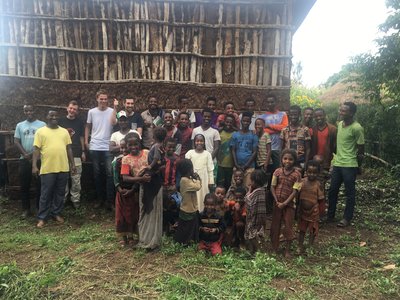AgUnity is an Australian-based AgTech startup founded in 2016 with the ambition to help change the lives of the 1-billion plus smallholder farmers in the world. Tackling issues of a lack of trust, corruption & graft, poor record-keeping and farming inefficiencies, AgUnity has developed a smartphone and blockchain-based solution for the world’s poorest farmers, a simple mobile app restoring trust and enabling cooperation.
AgUnity is continuing in the pilot phase of its application, with a focus in 2018 on validating the business model, to ensure financial sustainability and a successful scaling of the business in 2019 and beyond. AgUnity has identified Ethiopia as a new location with great potential for achieving this validation and also for trialling a new crop, coffee, within the AgUnity ecosystem. The proposed pilot is for 100 smallholder coffee farmers (50 males / 50 females) in Limu Kosa, Jimma, and will be done in partnership with a number of local organisations.
The objectives of the AgUnity Pilot Project in Ethiopia are:
- To increase the awareness of trust and transparency between the participating farmers;
- To increase the welfare of the farmers;
- To help farmers in recording their planting season data, starting from the planning stage through to the post-harvesting stage;
- To increase financial independence of participating female farmers.
Why Ethiopia?
Several key attributes of Ethiopia make it particularly well placed to derive maximum benefits from the proposed project, including:
Ethiopia is an agricultural economy
Agricultural production is central both to the subsistence economy and to the market economy in rural Ethiopia, with coffee being a crop of major importance in many areas including the target area of Limu Kosa. An estimated 72.7% of the population is employed in agricultural production, with up to 15% involved in coffee production, processing and marketing. The Ethiopian government recognises agriculture’s pivotal role in the national economy in its five-year Growth and Transformation Plan, wherein the Agricultural Transformation Agency seeks to deliver improved technologies and infrastructure as well as increased food security to rural farmers.
High potential for impact
The limited profitability of agriculture and the lack of other livelihood options results in high levels of poverty in rural Ethiopia, including Limu Kosa. It is at these extremely low-income levels that significant improvements are most achievable, as an increase of only a few hundred dollars per person per year could have a transformative effect on the lives of smallholder farmers, allowing them to lift themselves out of poverty. Additionally, the choice of focus crop is an important factor. Despite the small unit prices paid to smallholder coffee farmers, coffee is a crop with a relatively high market value, thus exhibiting a large price differential. This is an important point because it delineates the maximum portion of the crop’s unit value that can be recovered through value adding such as improved cooperation, market access and traceability. Further improvements beyond this point may also be achieved through specialisation and certification to increase the market value of coffee products.
Farming co-operatives are plentiful
There is a longstanding tradition of agricultural co-operatives in Ethiopia, beginning in the 1950s, to act as a bridge between primary producers and markets. The most recent phase of Ethiopian cooperatives aligns with the national government’s Growth and Transformation Plan, which focuses on ‘market integration and value chain development’. The most recent estimates suggest the existence of over 40,000 co-operatives nationally, with a total membership of 6.5 million. Within these co-operative structures however, marginalisation, exploitation and under-performance persist, and it is within this context that AgUnity’s technology can enable the trust and cooperation that is essential to ensuring their success and on-going sustainability.
Rapid growth in telecommunications coverage
State-owned EthioTelecom’s longstanding monopoly on telecommunications services in Ethiopia has seen Ethiopia lag behind other African nations in terms of mobile service provision, with prohibitive pricing and poor coverage. However, recent network expansion, price improvements and the upgrade to a national 3G network has seen mobile subscription rates climb to over 60 million, representing a near 10-fold increase in mobile subscription rates since 2010. Coverage now reaches 85% of the nation’s populated areas, and internet subscription rates are predicted to reach 56 million by 2020. Additionally, with Prime Minister Abiy Ahmed taking office in April 2018, progressive reforms have been pledged, which may include the eventual deregulation of the telecommunications sector. Telecommunications are set to play a major role in Ethiopia’s development in the coming years and will have a particularly transformative impact in rural areas.
AgUnity sees huge impact potential working with smallholder coffee farmers in Ethiopia, and this first pilot is an excellent opportunity to learn and understand the industry at the birthplace of coffee. The deployment of AgUnity phones and the AgUnity App to help improve trust and transparency between farmers, co-ops and third-party NGOs and businesses is anticipated to not only lead to improved efficiency, increased and better yields and ultimately increased incomes, but that these improvements are made in a sustainable and scalable manner.
